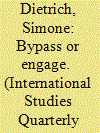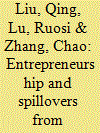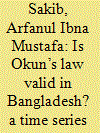| Srl | Item |
| 1 |
ID:
126516


|
|
|
|
|
| Publication |
2013.
|
| Summary/Abstract |
The conventional wisdom in the literature on aid allocation suggests that donors utilize bilateral aid as a tool to buy influence in the aid-receiving country. Those who conclude that aid is driven by donor self-interest focus on government-to-government aid transfers. However, this approach overlooks important variation in delivery tactics: Bilateral donors frequently provide aid to nonstate actors. This paper argues that donors resort to delivery tactics that increase the likelihood of aid achieving its intended outcome. In poorly governed recipient countries, donors bypass recipient governments and deliver more aid through nonstate actors, all else equal. In recipient countries with higher governance quality, donors engage the government and give more aid through the government-to-government channel. Using OLS and Probit regressions, I find empirical support for this argument. Understanding the determinants of donor delivery tactics has important implications for assessing aid effectiveness.
|
|
|
|
|
|
|
|
|
|
|
|
|
|
|
|
| 2 |
ID:
133190


|
|
|
|
|
| Publication |
2014.
|
| Summary/Abstract |
Using nationwide survey data in China, we find evidence of positive FDI spillover effects via entrepreneurship. After controlling for a series of entrepreneur and firm attributes, our OLS estimates suggest that private firms run by entrepreneurs with MNE work experience outperform their counterparts run by entrepreneurs without MNE work experience. To deal with the potential endogeneity in the sense that inherently more capable entrepreneurs may self-select into MNEs before launching their own businesses, we use a nonparametric way, i.e., the propensity score matching (PSM) method, to identify the MNE "treatment" effect. The PSM estimates remain consistent with the OLS evidence, and the estimates are robust to different sensitivity analyses. We further find that private firms run by MNE-trained entrepreneurs do operate differently from their counterparts in both their global involvement and internal management, which are the underlying channels of the spillovers.
|
|
|
|
|
|
|
|
|
|
|
|
|
|
|
|
| 3 |
ID:
193049


|
|
|
|
|
| Summary/Abstract |
Using the data from 1991 to 2019, this study attempts to verify Okun’s law by utilizing both ‘The difference and the dynamic versions’ of Okun’s law in Bangladesh and tries to find the value of Okun’s coefficient. The autoregressive-distribution lag (ARDL) bounds test is applied to determine the existence of a long-term relationship between the variables, and then the ordinary least squares (OLS) approach is used to estimate the findings. The findings show that Okun’s coefficient is –0.058 for the difference version of Okun’s law, which is statistically insignificant. In addition, for the dynamic version of Okun’s law, findings show that the effect of the ‘immediate past economic growth rate’ on ‘current change in the unemployment rate’ is 0.15, and it is statistically insignificant too. However, the effect of the ‘current economic growth rate’ on ‘current change in the unemployment rate’ is –0.22, and it is statistically significant at 10% significance level. In both versions of Okun’s law, R2 values, F-statistic and cumulative sum of squares show the instability of the models. Due to statistically insignificant coefficients and model instability, it can be concluded that Okun’s law is invalid in Bangladesh.
|
|
|
|
|
|
|
|
|
|
|
|
|
|
|
|